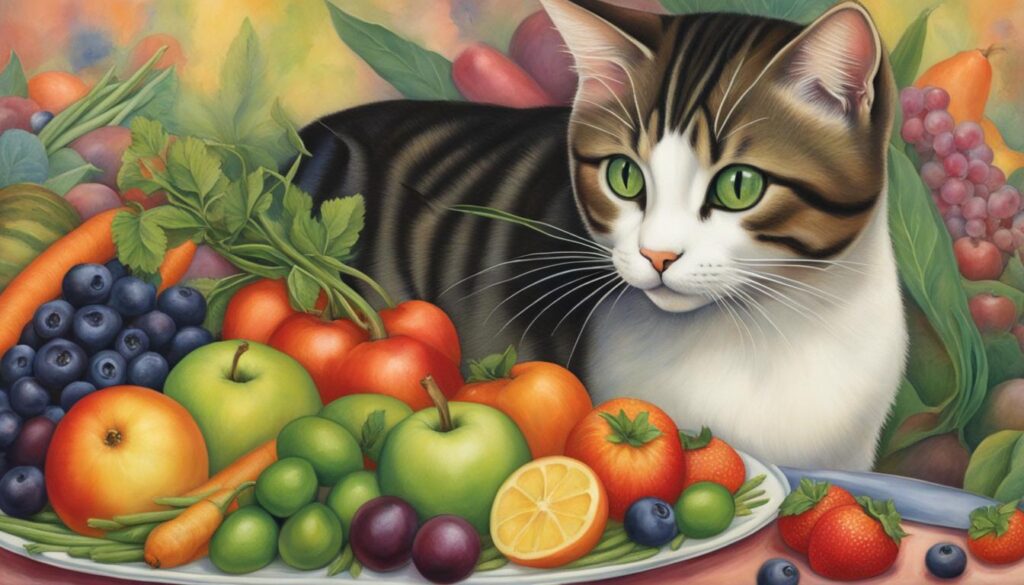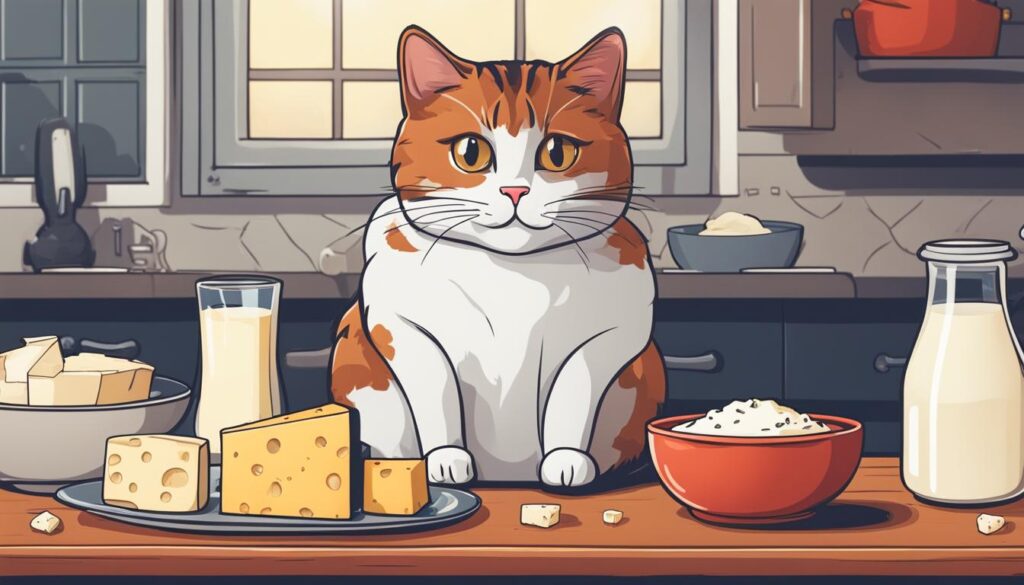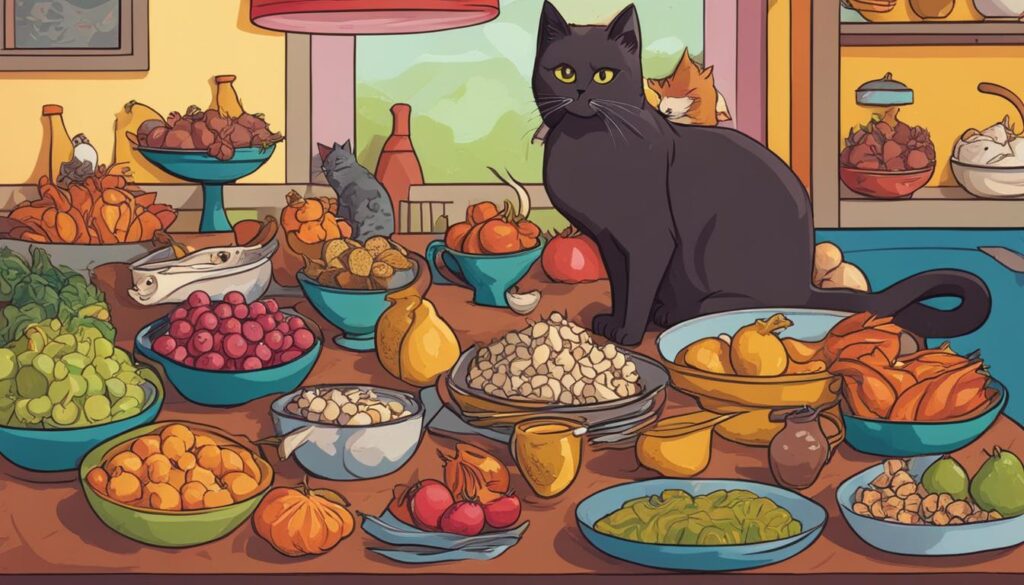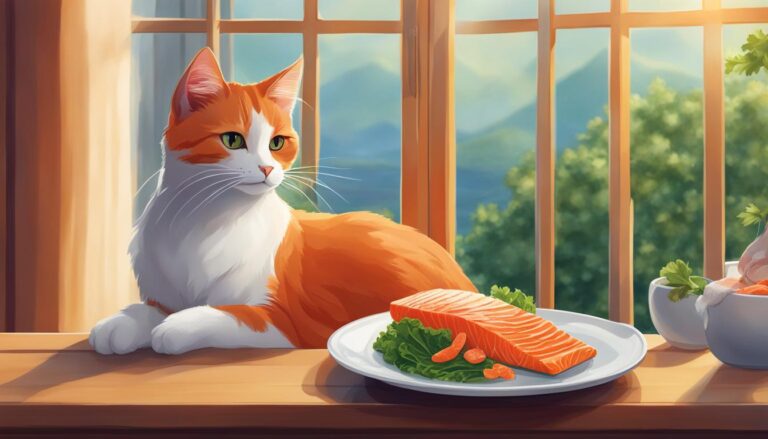Cats can eat certain human foods in moderation, but it’s important to know which ones are safe for them. While cats should primarily be fed a complete and balanced cat food, there are some human foods that can be shared with felines. It’s crucial to understand the foods that are safe for cats to eat to ensure their health and well-being.
Viktiga slutsatser
- Cats can safely consume cooked lean meats, such as beef, chicken, turkey, liver, and lamb.
- Cooked and deboned fish, such as tuna, can be a healthy addition to a cat’s diet.
- Some fruits and vegetables, like apples, bananas, blueberries, strawberries, carrots, and green beans, can be safely fed to cats in small amounts.
- Whole grains, such as oats, corn, brown rice, and couscous, can be included in a cat’s diet in moderation.
- Most cats are lactose intolerant, so it’s best to choose lactose-free options if offering them any dairy products.
Safe Meats for Cats
Cats can safely consume a variety of cooked lean meats, which can be a healthy addition to their diet. Some safe meats for cats include:
- Beef
- Chicken
- Turkey
- Liver
- Lamb
It is important to ensure that the meat is fully cooked and that all skin and bones are removed before feeding it to your cat. Cooked meats provide cats with essential proteins and nutrients. However, raw meats should be avoided as they can pose a risk of bacterial contamination and potential illness.
Offering your cat small portions of these cooked meats occasionally can provide them with variety and additional nutrients while still ensuring their overall health and well-being.
Safe Meats for Cats – Nutritional Comparison
| Meat | Protein Content (per 100g) | Fat Content (per 100g) |
|---|---|---|
| Beef | 26g | 9g |
| Chicken | 25g | 11g |
| Turkey | 29g | 2g |
| Liver | 20g | 4g |
| Lamb | 25g | 18g |
Feeding your cat small portions of cooked lean meats like beef, chicken, turkey, liver, and lamb can contribute to their protein intake and overall health. Remember to prepare the meats properly by cooking them thoroughly and removing any skin or bones. Raw meats should be avoided to prevent potential bacterial contamination. Offering a variety of safe meats can provide dietary diversity and help keep your feline friend happy and healthy.
Fish and Your Feline
For many cats, fish is a highly appealing and tasty option. Fortunately, most types of fish are safe for feline consumption. Cooked and deboned fish, such as tuna, can be a healthy addition to your cat’s diet. Fish is rich in omega-3 fatty acids, which can offer various health benefits for your furry friend. However, it’s crucial to ensure that the fish is properly cooked and that all bones and skin are removed before feeding it to your cat.
Fish that is properly cooked helps to eliminate the risk of any potential harm to your cat’s health. The cooking process ensures that any harmful bacteria or parasites are destroyed, making the fish safe for consumption. Additionally, removing the bones and skin reduces the risk of your cat choking or experiencing any digestive issues. To further enhance the safety of the fish, it is recommended to opt for low-mercury fish options, such as salmon and trout, as these are generally safer for cats to consume in moderation.
Remember, while fish can provide a valuable addition to your cat’s diet, it should not replace a complete and balanced cat food. Fish alone may not fulfill all of your cat’s nutritional needs. It’s always best to consult with your veterinarian to ensure that your cat’s diet is appropriately balanced and meets their specific dietary requirements.
Fruits and Vegetables that are Feline Friendly
While cats are obligate carnivores, meaning they primarily rely on animal protein, there are some fruits and vegetables that can be safely fed to them in small amounts. These foods can provide added nutrients and variety to your cat’s diet. Here are some feline-friendly fruits and vegetables:
Fruits
- Apples (peeled and without seeds) – Apples can be a refreshing and crunchy treat for cats. Just make sure to remove the seeds as they contain trace amounts of cyanide, which can be harmful to cats.
- Bananas (in moderation due to high sugar content) – Bananas can be given as an occasional treat. However, due to their high sugar content, it’s best to offer them in small amounts.
- Blueberries – Blueberries are rich in antioxidants and can be a healthy addition to your cat’s diet. They can be served fresh or frozen.
- Strawberries – Strawberries are another fruit that cats can enjoy in moderation. They are packed with vitamins and minerals.
- Watermelon (remove seeds and skin) – Watermelon is hydrating and low in calories, making it a good choice for a summer treat. Just make sure to remove the seeds and rind before offering it to your cat.
Vegetables
- Carrots (cooked) – Cooked carrots are safe for cats and can provide them with a source of beta-carotene, which promotes healthy eyes and skin.
- Green beans – Green beans are a good source of fiber and can be offered as a low-calorie snack or as a supplement to your cat’s regular meals.
Remember, when introducing any new food to your cat, start with small amounts and observe how they react. Monitor for any signs of digestive upset or allergies. It’s always best to consult with your veterinarian before making any significant changes to your cat’s diet.
| Fruit/Vegetable | Safety Notes |
|---|---|
| Apples | Peel and remove seeds |
| Bananas | In moderation due to high sugar content |
| Blueberries | Can be served fresh or frozen |
| Strawberries | In moderation |
| Watermelon | Remove seeds and skin |
| Carrots | Cooked |
| Green beans | Can be served as a snack or supplement |

Grain Options for Cats
While cats are primarily carnivores, meaning their diet should consist mainly of animal protein, there are some grain options that can be included in their meals. Whole grains like oats, corn, brown rice, and couscous can provide additional nutrients and fiber to support your cat’s overall health. However, it’s important to note that grains should only be given in moderation as cats don’t require carbohydrates in their diet.
Grains can be cooked and added to your cat’s regular meals or served as occasional treats. Remember to cook the grains thoroughly to make them easier for your cat to digest. You can also consider incorporating these grains into homemade cat treats or mixing them with your cat’s wet food for added texture and variety.
The Benefits of Whole Grains for Cats
Whole grains offer several benefits for cats when included in their diet. They are a good source of protein, which is essential for maintaining muscle mass and supporting various bodily functions. Additionally, whole grains can provide vitamins, minerals, and antioxidants that contribute to your cat’s overall well-being.
When feeding your cat grains, it’s important to monitor their reaction. Some cats may have sensitivities or allergies to certain grains, so watch for any signs of digestive upset or adverse reactions. If you notice any unusual symptoms or concerns, consult your veterinarian for guidance.
| Grain | Nutritional Profile | Serving Size |
|---|---|---|
| Oats | Oats are rich in dietary fiber and contain essential vitamins and minerals such as manganese and thiamine. | 1-2 tablespoons |
| Corn | Corn provides carbohydrates, fiber, and essential fatty acids for energy and a healthy coat. | 1-2 tablespoons |
| Brown Rice | Brown rice offers complex carbohydrates and essential minerals like magnesium and selenium. | 1-2 tablespoons |
| Couscous | Couscous is a good source of protein, dietary fiber, and B vitamins for overall health. | 1-2 tablespoons |
Remember, grains should only supplement your cat’s diet and not replace their primary source of nutrition, which should come from a complete and balanced cat food. Always consult with your veterinarian before introducing new foods to your cat’s diet to ensure their dietary needs are being met.

“Not all cats can digest dairy products, so it’s important to introduce them slowly and in small amounts to see how your cat reacts,” advises Dr. Sarah Johnson, a veterinarian at Feline Health Clinic.
“If your cat shows signs of stomach upset, such as diarrhea or vomiting, it’s best to avoid dairy altogether.”
It’s important to note that the lactose content in different dairy products can vary. Some cats may be able to tolerate certain dairy products but not others. For example, some cats may be able to handle a small amount of lactose-free yogurt without any issues but experience digestive problems if they consume regular milk. Always be cautious when introducing dairy into your cat’s diet and consult with your veterinarian for personalized advice.
To summarize, while dairy products can be enjoyed by some cats, it’s crucial to be mindful of their lactose tolerance. Opt for lactose-free options or consult your veterinarian for suitable alternatives. Remember to introduce dairy slowly and monitor your cat for any adverse reactions. Your cat’s health and comfort should always be the top priority when considering human foods for their diet.
Foods to Avoid for Cats
When it comes to feeding your beloved feline, it’s important to know that not all human foods are safe for cats. Certain foods can be toxic or harmful to their health and should be avoided at all costs. Here are some foods that should never be given to cats:
- Chocolate: The sweet treat that humans love is actually toxic to cats. Chocolate contains theobromine, which can cause vomiting, diarrhea, rapid breathing, and even seizures in cats.
- Caffeine: Coffee, tea, energy drinks, and other caffeinated beverages should never be given to cats. Caffeine can cause elevated heart rate, tremors, panting, and even collapse in felines.
- Onions and Garlic: These common kitchen ingredients contain compounds that can damage a cat’s red blood cells, leading to anemia. It’s important to avoid feeding your cat any foods that contain onions or garlic, including onion powder and garlic salt.
- Grapes and Raisins: Grapes and raisins can cause kidney failure in cats, so it’s crucial to keep these fruits away from your feline friend.
- Alcohol: Cats should never consume alcohol in any form. Even a small amount can be extremely dangerous and potentially fatal for them.
- Foods sweetened with xylitol: Xylitol is a sugar substitute commonly found in sugar-free gum, candy, and baked goods. It can cause a rapid release of insulin in cats, leading to hypoglycemia (low blood sugar).
These are just a few examples of foods that can be harmful to cats. It’s important to keep these foods out of reach and to educate yourself about potential dangers. If you suspect that your cat has ingested any toxic substances or is showing signs of illness after consuming human food, contact your veterinarian immediately. It’s always better to be safe than sorry when it comes to your cat’s health.

Slutsats
While cats have specific dietary needs and should primarily be fed a complete and balanced cat food, there are some human foods that can be shared with them in moderation. It’s important to know which foods are safe for cats to ensure their health and well-being.
Consult with your veterinarian before introducing new foods to your cat’s diet, as they can provide personalized recommendations based on your cat’s specific needs. Remember, moderation is key to maintaining a balanced and nutritious feline diet.
By understanding the safe human food options for cats, you can provide your feline companion with occasional treats and variety while keeping their health in mind. Always prioritize their well-being and avoid any potential harmful foods, such as chocolate, caffeine, onions, and garlic.
Continue to educate yourself about safe human foods for cats. With the right knowledge and guidance, you can make informed choices that contribute to your cat’s overall health and happiness.




